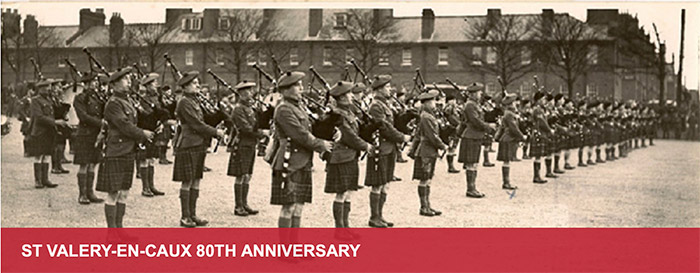
Eighty years ago today, at St Valery-en-Caux, France, men of the 20,000 strong 51st Highland Division surrendered to German forces under the command of Major General Erwin Rommel. The division had fought almost continuously for ten days against overwhelming odds. Exhausted and out of ammunition, they were surrounded by vastly superior forces. Rescue by sea from the coastal town proved impossible.
The Division’s valiant effort bought time for the British Expeditionary Force and contributed to the success of the evacuation at Dunkirk. The captured soldiers were marched from St Valery into Germany or Poland where most remained until liberation in 1945.
By Cailean Maclean
Pipes and weapons had to be abandoned and during the march the soldiers relied on locals to feed them during days of exhaustion and privation when they had to sleep by the roadside in all weathers.
Famous pipers caught up in the debacle were William MacDonald, Inverness, P/M Donald MacLeod, Lewis, who escaped and returned to fight at the front once more, P/M Donald Maclean, Lewis, the composer of the tune the Heroes of St Valery, John Wilson, Edinburgh & Toronto, Ian Lawrie, the son of William Lawrie (Ballachulish) and George MacIntyre, Campbeltown, the noted composer.
While in captivity the PoWs were provided with a newspaper which was published in Berlin by the Nazi authorities. Some of these papers were brought back to Scotland by returning PoWs and I have fallen heir to a few copies. Actually, I had a lot more of them but gave some to the Highlanders’ Museum at Fort George and to archives locally.
The masthead below is of the edition of the paper which probably gave the PoWs their first news of Pearl Harbour:
Inside this issue was a short, light-hearted ditty about piping written by one of the PoWs, WJ Maitland. I notice he asks forgiveness of ‘a Piping Society’. Does that suggest there was one in the camp?
More on St Valery
- It is possible there was some sort of piping activity in the camps which housed pipers. There are minutes in the annals of the Piobaireachd Society which describe sending pipes via the Red Cross to Germany.
- John Wilson composed and published in his second book the hornpipe, St Valery.
- Donald MacLeod seldom spoke of his escape via France, Spain and Gibraltar but remarkably he was back at Fort George before Christmas of that year. The story is that he had been picked up by the Resistance and always spoke in his native Gaelic when challenged and was taken for a foreign worker from eastern Europe. All ‘wee’ Donald ever said about it was that he was so small the Germans didn’t pay any heed to him.
- Donald returned to France later in the war and piped the 7th Seaforths across the Rhine against the wishes of his Commanding Officer.
- It is believed Donald Maclean composed his famous march Major Manson at Clachantrushal on a practice chanter fashioned from bits of wood by Northern Irish piper Alex Craig when they were both incarcerated in the same PoW camp.
- The 51st had been detached from the British Expeditionary Force (BEF) and therefore managed to escape encirclement around Dunkirk. Instead, from 4 June they conducted a fighting withdrawal under French command. The speed of the German advance was such that they were cut off.
- Mirroring the effort at Dunkirk, a flotilla of merchant ships and small vessels was despatched from British ports on a rescue mission but inclement weather and German artillery on cliffs overlooking the town made evacuation impossible.
- Many men were killed in the fierce fighting, or fell to their deaths from the cliffs trying to escape.
- The men had been fighting almost continuously for ten days against overwhelming odds. They were exhausted and virtually out of ammunition, with no artillery ammunition at all. Shortly before 10.00hrs on the 12th June the CO, Major General Fortune, took the decision to surrender.
- The 51st Highland Division, initially about 20,000 strong, comprised nine battalions of the Highland infantry regiments with supporting arms and services, including elements from England.
- In 1944, some months after D-Day and the subsequent breakout, the 51st were given the honour of liberating St Valery the pipes and drums playing through the town in triumph. However it would be some months before their comrades would be released from incarceration in eastern Europe.